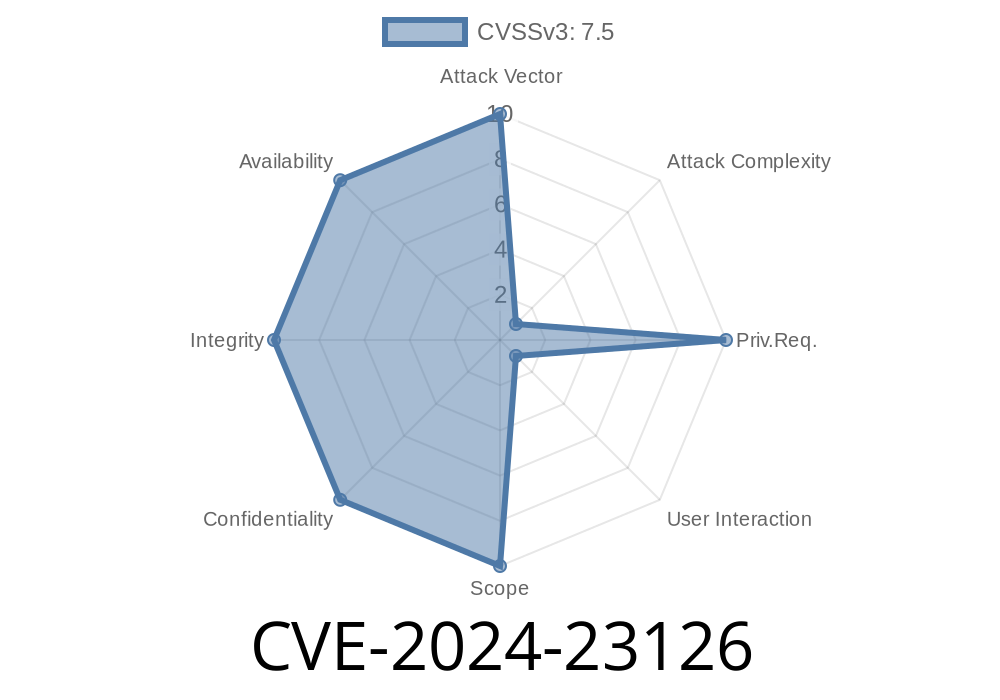In early 2024, a serious vulnerability — CVE-2024-23126 — was discovered in Autodesk AutoCAD. The issue lies in how AutoCAD’s CC5Dll.dll handles certain CATPART files. With a specially crafted file, an attacker can hijack AutoCAD’s execution flow, potentially crashing the app, stealing sensitive data, or running malicious code. This article breaks down the technical details, real-world impact, and provides a demonstration of how this flaw is exploited.
What is CVE-2024-23126?
CVE-2024-23126 is a stack-based buffer overflow vulnerability in CC5Dll.dll, a library used by AutoCAD to parse CATPART files. When a CATPART file with maliciously crafted data is imported, data overflows into the stack, which may lead to arbitrary code execution. In simpler terms, by opening a booby-trapped 3D part file, AutoCAD users could unwittingly let hackers take control of their system.
How Does the Vulnerability Work?
The stack-based overflow happens because CC5Dll.dll fails to properly check the length of input data from CATPART files before copying it into a fixed stack buffer. If the attacker crafts a CATPART file with extra-large data in a certain field, the function that parses this data (say, a string or block of bytes) doesn’t stop at the buffer boundary. The result: the buffer overflows, overwriting legitimate data, sometimes including the instruction pointer (EIP/RIP), allowing execution of arbitrary code.
Proof of Concept: Minimal Exploit
Below is a simplified snippet in C, showing a vulnerable parsing function similar to what might be in CC5Dll.dll:
// Vulnerable function pseudocode
void parse_CATPART_field(char *input) {
char buffer[128];
// No check on input length!
strcpy(buffer, input); // <-- Stack overflow if input > 128 bytes
// Further processing...
}
An attacker could create a CATPART file with a field set to repeat ‘A’ 256 times. This will overwrite whatever sits next on the stack (such as saved EIP/RIP or function pointers).
Creating a Malicious CATPART File (PoC)
A real CATPART file is binary, but for demonstration, let’s build a PoC with a field the DLL expects, overloaded with excessive data:
# exploit_catpart.py
with open("exploit.catpart", "wb") as f:
f.write(b"CATA") # Fake header
f.write(b"A" * 512) # Overlong field, triggering overflow
f.write(b"\x90" * 16) # NOP sled (in real attack, this could be shellcode)
# ... rest of file structure as needed
When loaded into vulnerable AutoCAD versions, this file would cause a crash, and with further refinement, run attacker’s code.
Target: End users of AutoCAD opening or importing 3D CATPART files.
- Attack Vectors: Phishing (via email attachment or download), or compromise of shared network drives/assets.
Result: Crash, sensitive data leak, or system compromise in the user’s security context.
A threat actor could distribute malicious CATPART files disguised as legitimate 3D assets or parts. The unsuspecting engineer or designer opens the file, and the attack is triggered.
Recommendations & Mitigations
- Update: Autodesk has released a patch.
Use modern endpoint protection that can analyze and sandbox office and CAD files.
- Network segmentation: Don’t let machines with critical data be directly exposed to risky file types from collaborators.
References
- NVD Entry: CVE-2024-23126
- Autodesk Security Advisory
- AutoCAD 2024.1.2 Update Notes (Mitigation)
- Bufferoverflows.net - Simple Stack Overflow Examples
- CATPART File Format Wiki
Conclusion
CVE-2024-23126 is a prime example of how old-school buffer overflows continue to haunt even heavily engineered commercial software. It’s a reminder that file parsing code — especially for complex, proprietary formats — is fertile ground for attackers.
If you use AutoCAD, patch now and think twice before opening files from unknown sources. If you’re an administrator or infosec pro, watch for unusual AutoCAD crashes or out-of-place files, which could signal attempted exploitation.
Timeline
Published on: 02/22/2024 03:15:08 UTC
Last modified on: 08/01/2024 13:47:06 UTC
